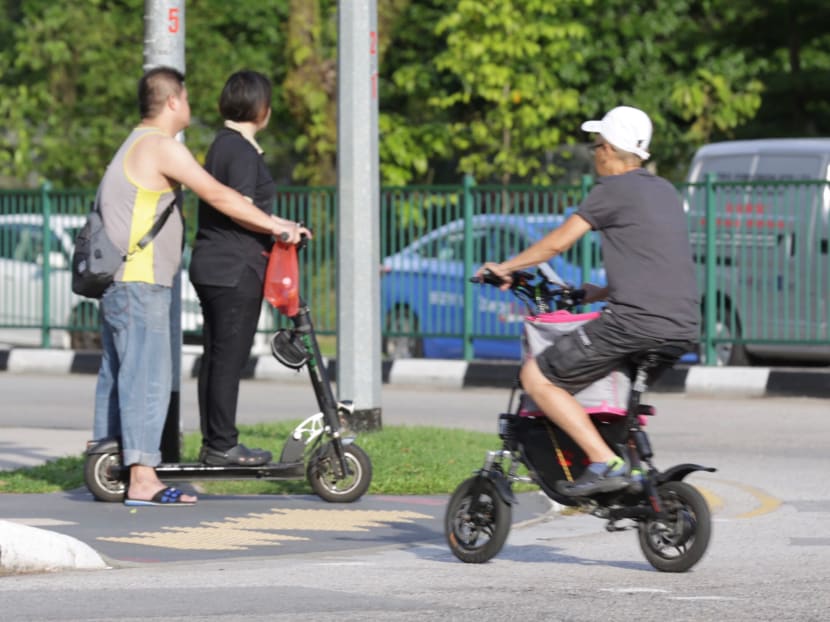E-scooter footpath ban, minimum riding age set to become law under proposed changes to Active Mobility Act
SINGAPORE — The ban on electric scooters on footpaths and a minimum riding age are set to be written into law as the Government tabled amendments to the Active Mobility Act on Monday (Jan 6).

The Amendment Bill also makes related changes to the Road Traffic Act — which regulates road traffic, the use of vehicles and road users — to beef up penalties for offences related to personal mobility devices.
SINGAPORE — The ban on electric scooters on footpaths and a minimum riding age are set to be written into law as the Government tabled amendments to the Active Mobility Act on Monday (Jan 6).
The law, which came into force in May 2018, lays out rules governing the safe use of public paths.
The aim of the proposed changes is to strengthen the regulatory regime governing mobility vehicles and retailers, and promote safety on public paths, the Ministry of Transport (MOT) said in a statement on Monday (Jan 6).
The Amendment Bill also makes related changes to the Road Traffic Act — which regulates road traffic, the use of vehicles and road users — to beef up penalties for offences related to personal mobility devices.
The changes will be debated in Parliament next month, MOT said.
Here are the changes to the Act at a glance:
BAN ON MOTORISED VEHICLES ON FOOTPATHS
The Government has proposed amending the Act to ban all motorised mobility vehicles from Singapore’s footpaths. The authorities barred electric scooters from footpaths on Nov 5 last year, and these vehicles are now allowed only on bicycle paths and park connectors.
Other motorised mobility devices, such as electric hoverboards and unicycles, will be banned from footpaths progressively by March.
MINIMUM AGE, MANDATORY THEORY TEST FOR RIDERS
Changes to the Act will also open the way for the roll-out of the latest recommendations to improve path safety.
In September last year, on the heels of the death of a cyclist who was hit by an e-scooter rider in Bedok, an advisory panel examining rules that govern the use of mobility vehicles, bicycles and other equipment recommended that the Government take steps to improve safety on shared paths. In December, the Government accepted the Active Mobility Advisory Panel’s recommendations. They include:
Minimum age: Users of e-scooters must be at least 16 years old and take a theory test before they can ride their devices on public paths. This rule will be extended to users of electric bicycles. Underaged riders could be fined up to S$1,000, jailed for up to three months, or both. Repeat offenders could receive a fine of up to S$2,000, be jailed for up to six months, or both.
Restricted mobile-phone use: E-scooter riders will not be allowed to use mobile phones while riding unless the phones are mounted or used in a hands-free manner. Users could be fined up to S$1,000, jailed for up to three months, or both. Repeat offenders could face tougher action: A fine of up to S$2,000, up to six months behind bars, or both.
Third-party liability insurance: Businesses must cover their riders who use e-scooters for work with third-party liability insurance, which allows victims to file claims for damages. The Government will also extend this requirement to those who use other mobility devices for work. For instance, individuals who flout this rule could be fined up to S$10,000, jailed for up to 12 months, or both.
MANDATORY E-SCOOTER INSPECTION
The Government announced last year that all e-scooters will have to undergo mandatory inspection every two years from April 1, 2020. This will allow the authorities to better clamp down on illegal modifications of devices and ensure compliance with the rules.
The changes to the Act put in place this inspection regime.
The amendments also expand the regulatory regime to cover all modifications of devices used on public paths. This covers users who modify their own vehicles and those who do so for others without compensation.
STIFFER PENALTIES FOR OFFENCES
The changes to the law will also increase the maximum penalties for some offences under the Act to deter errant and irresponsible behaviour by users and retailers.
For instance, anyone who sells a non-compliant electric bicycle, mobility device, bicycle, or an uncertified vehicle for use on public paths, could be fined up to S$20,000 or jailed for up to 24 months, or both. Repeat offenders could be fined up to S$40,000 or jailed for up to 48 months, or both.
By contrast, under the Act right now, anyone who sells an uncompliant electric bicycle, mobility device or bicycle for use on public paths could be fined up to S$5,000, jailed up to three months, or both. Repeat offenders could be fined up to S$10,000, or jailed for up to six months, or both.











